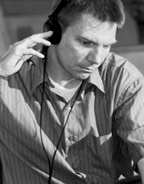Reaching out to composers via the World Wide Web, a group of Chicago instrumentalists offers recorded readings of new and nascent works.
Seth Boustead“It’s kind of a lofty idea,” says Seth Boustead. “We want to revitalize classical music.” A disarming manner belies his ambition. An easy laugh punctuates most of boustead’s conversation, and his boyish haircut and impish smile shave a few years off his current 36. Accessible Contemporary Music (ASM), the chicago-based organization he started six years ago, has given more than a hundred composers first hearings of their works and recruited dozens of players and new listeners.
Flutist Laura Koepele-Tenges, a co-founder of Accessible Contemporary Music, explains the group’s purpose simply: “When Seth and I started ACM, we wanted people not to make the face they tend to make when they hear the words ‘contemporary music’.”
The “Weekly Reading” lies at the heart of ACM’s mission. Every week from September to May, ACM posts a new work of chamber music to the Internet. The piece comes to life during a single two hour session. The organization accepts scores from composers all over the world and, to play them, brings together the necessary musicians, many of whom became friends at the founders’ alma mater, the conservatory of Roosevelt University in Chicago.
In a public space borrowed for the occasion, the musicians rehearse the work and immediately record it on Boustead’s portable studio—a mini-disc recorder the size of a Kit-Kat bar and an omni-directional microphone no bigger than a cigar. After splicing, mixing, and reducing noise at his home computer, Boustead posts the result to ACM’s website, www.acmusic.org.
The service is free. The musicians are volunteers. The idea could be replicated elsewhere. Boustead hopes it will be, because he developed his blitz tactics to benefit underserved musicians. “The Weekly Readings are for composers in remote areas,” says Boustead, a pianist and composer himself. “If composers are going to improve, they need to hear their work played. When Haydn went to work for the Esterhazy family, he had an orchestra to experiment with all the time. He could run downstairs to try something out, then go back upstairs to revise it. Composers need that.”
When it comes to scores, ACM’s selection criteria are simple: there are none.
“The point is to be an organization that doesn’t select,” says Boustead. “I want to record everyone. We’ll take anybody’s score, unless it’s insanely hard, or it needs a conductor, or it requires musicians we don’t have. We don’t always get the best composers, frankly, but inexperienced composers are the ones who most need to hear their own music. They learn a lot from the musicians’ comments, and sometimes they get comments from listeners on the website.”
Seth Boustead
In a Chicago church, ACM co-founder Seth Boustead wears earphones as he records a reading of Catching Updrafts, a quartet by David Heuser. The composer remained at home, in San Antonio, Texas. Also pictured above are ACM members KT Somero, clarinet, and Joe Miller, cello.
Given this philosophy, ACM won’t finish reading its first round of scores until May, 2009; so as the organization becomes better known, it may have to modify its wide-open policy. Boustead first put out the call in 2004, posting free notices with the American Composers Forum and the American Music Center, stipulating only that works be written for small ensembles or solo instruments.
Boustead received more than a hundred new pieces and put them in a file cabinet. Using $1,500 of his own money, he bought recording equipment and web hosting. Then he went to work designing and coding ACM’s site, using skills he picked up at the day job he held during ACM’s first two years. (He worked his way up from temporary file clerk to tech-support expert at an Internet service company, studying HTML manuals after hours.)
When he began to post Weekly Readings, he made what he now calls “my most devastating mistake.” He learned the hard way that an early generation of streaming software, which allows Internet visitors to download and play music simultaneously, had a very short shelf life. Recordings made with that software have faded out of the ACM archive and survive only as titles in a dark font.
Boustead now loads each digital recording into his Apple computer and uses GarageBand to splice, adjust volumes, and master it. After burning the file to a PC, he uses WavePad for noise reduction, then saves each reading as both a wav file and an MP3 file, burning a hard copy for backup.
Boustead explains, up front, that an ACM reading is exactly— and no more than—a reading.
“It’s not for everybody,” he cautions. “We make it really clear this is a reading, not a polished performance. If we get a score from an internationally recognized composer, I’ll send an email asking, Are you sure you want this?”
In theory, ACM’s ideas could be copied by anyone, but they have not yet taken hold in other parts of the country. The concept of the Weekly Reading appears to be unique.
“They have no panel of adjudicators?” asked John Nuechterlein, president of the St. Paul-based American Composers Forum. “That does sound unique.” Ed Harsh, president of Meet the Composer, and Frank Oteri, composer advocate for the American Music Center, agree that ACM is breaking new trail.
Oteri commends ACM—and praises Boustead for traveling to New York for the American Music Center’s annual meetings—but he offers a list of possible stumbling blocks. A start-up group could be thwarted, he says, by high rents for rehearsal space; lack of agreement with unions regarding compensation for a work clearly not intended for commercial use; performers may object to sub-professional recording quality or may nix releasing a recording if they flub a few notes.
In the company of Boustead and his colleagues, such concerns seem irrelevant. ACM’s musicians, all of whom are non-union, bring an uncommon degree of altruism and enthusiasm to their work. About two dozen instrumentalists have coalesced into a core ensemble which, when the need arises, seeks new or replacement members from the ranks of grad students, music teachers, and young professionals flowing through the Chicago area.
The sentiments of co-founder Koepele-Tenges seem to be typical. “I’m intrigued by people who can write music,” she says, “especially when that music tugs at my core, makes me ache. I want to be involved with the process, the living statement. ‘New’ or ‘premiere’ has always had great appeal to me.”
Henry Fogel, when asked to join ACM’s advisory board, readily agreed. During his tenure as executive director of the Chicago Symphony Orchestra, then as president of the League of American Orchestras, he had frequently assailed the barriers between new music and entrenched listeners.
“Before I heard a note,” says Fogel, “the name got to me. To blatantly name an organization Accessible Contemporary Music grabbed me. For thirty or thirty-five years, we went through a period when the more complex, atonal, and difficult music was, the better it was supposed to be. To write with tunes or harmony was seen as a big negative. So when I heard the name, I said, ‘I’ve gotta help.’ I’d love to see this program grow and spawn children around the country. It’s astonishing for one guy to do what Seth has done.”
ACM has grown from a group with a file cabinet and a dream into a concert-giving, class-teaching, rent-paying, 501(c)(3) with an annual budget of $95,000. The organization rents a single room in a modest commercial complex. A sheer curtain divides a table-and-chairs office from a music studio, where a spinet piano leaves space for about six players with instruments and stands. Although Boustead still uses his coat-pocket technology for outside jobs, he makes studio recordings on an impressive 200 MB hard-drive recorder with professional microphones.
In addition to Weekly Readings, ACM now presents a fiveconcert series that includes collaborations with dancers and silent-movie makers. Boustead teaches composition classes for adults and high school students, as well as a full schedule of piano lessons.
ACM now funds a commissioning project—Composer Alive!— to work with a distant composer via the Internet. Applying the idea of the Weekly Reading to a longer piece by an established composer, ACM spends $10,000 to fund the work and fly the composer to Chicago for the premiere. The composer agrees to submit the piece in installments. ACM’s musicians perform and post each one, inviting comments from online listeners as the work, and its revisions, proceed.
The unusual format promotes a degree of international collaboration that would not be possible without the Internet.
Jane O’Leary of Ireland, last year’s commissioned composer, submitted experimental sketches in addition to the installments.
“She really got it,” says Boustead. “She would send us these sound experiments, and that’s exactly what we’re here for.”
This year, after hearing the first two installments of his new piece, French composer Stephane Delplace reversed their order. The collaboration with Chinese composer Xiaogang Ye in 2006 inspired the making of a documentary film, Composer Alive: Eastern Expressions, part of which can be seen on the ACM website.
Despite ACM’s growth, Boustead retains his “man of the people” idealism.
“Too much of music is controlled by twenty or thirty white, academic men,” he says. “You don’t need to get a Ph.D., win awards, and study with the right people to write good music.”
One need only scratch Boustead’s surface to find the teacher within. He still drives the organization primarily by giving piano lessons, and he and fellow teacher Theresa Gigante earn 65 percent of ACM’s budget this way. Boustead is paid $37,000 as executive director, in which capacity he raises 25 percent of the budget through grants and 10 percent from individual donors. Although musicians still volunteer for the Weekly Readings, ACM has begun to pay its core group of stalwarts $100 per concert performance.
Seth Boustead AACM cellist Joe Miller
Before realizing in 2007 that he could support both himself and his organization through ACM, Boustead taught piano at two community music schools in Chicago. At the People’s Music School, an exemplary, tuition-free school that emphasizes music theory and the classical tradition, he says he met students who thought all the good music had already been written.
“I performed on every faculty recital while I was there,” Boustead says, “and, except for once, always played my own music and told people there are others like me, people still writing classical music.”
At the Old Town School of Music, he found the opposite— an ethic that celebrates community, jamming, and having a good time.
“At Old Town,” he says, “I was surrounded by people passionate about music who claimed to hate classical. They believed reading music was for snobs or robots. I’m not making this up! I’ve come to the conclusion that classical music is seen as irrelevant by younger people. It’s filled with unknowable jargon, and it has an almost creepy emphasis on youth and prodigies, all of whom are playing music by dead people.
“At ACM, we definitely encourage people to compose, no matter what their background is, to go to concerts, to get together and talk about music, and to get excited about the next Golijov premiere at the CSO. We want to educate people that the tradition is still alive and moving forward!”
Visits to the ACM website have grown, but they still hover at modest levels. The average number of listeners to Weekly Readings has jumped from 10 to 100, and about 330 people per day listen to music on the site as a whole. Boustead disdains mere “hits,” counting only visitors who linger long enough to hear one or more complete piece, whether it’s a new release or one from the archives. Curiously, a significant portion of the visitors come from Italy.
Beyond the composer, Boustead hopes the site will engage people who have no particular interest in classical music but are open to all kinds of new things, from novel food recipes to innovative sculpture, experimental architecture and various kinds of music. His own musical taste runs from Bernstein to Big Band to Radiohead.
David Hampton, 36, a Chicago architect who describes himself as a “new music freak,” typifies the listener Boustead craves. After many visits to the site, he signed up for ACM’s eight-week composition course for adults. He liked it so much he took it again and again.
“I have a lot of musical ideas,” says Hampton, “but I was just whistling into a tape recorder. Seth can take anyone with a love of music, but no training, and in pretty short order throw enough theory at them so they can write. He brings in the musicians to play for us, so we know how different instruments sound, and then we hear those professional musicians play our own work. I love it! When I was playing violin in high school, I completely missed the creative aspect of music-making.”
Boustead has a genius for motivating volunteers, a lucky trait given his dependence on musicians who are willing to work hard for free.
“I’m really nice to them,” he says with a laugh. He shows his appreciation openly by respecting their musicianship, asking them for only two or three readings a year, introducing them to other musicians, and trying to get them gigs. He puts their pictures and bios online and schedules performances and readings at clubs like the Green Mill, a venerable Chicago jazz venue, the Chicago Cultural Center, and high-profile museums.
Above all, he recruits musicians who love contemporary music. When he and Koepele-Tenges first brainstormed ACM over lunch five years ago, they wanted to build an organization for players as much as for composers.
“Laura was the first person who ever said, ‘Sure, I’ll play your music,’” says Boustead, “and initially it was for players. She wanted to perform more, and I wanted to hear my work performed.”
Among their first recruits was Alyson Berger, a cellist who teaches in the Evanston public school system. Berger frequently plays concerts, as well as the occasional Weekly Reading, and she now serves on ACM’s board of directors.
“Seth has a way of saying ‘This is going to be great’ that makes you want to be part of it,” says Berger, “and he’s reliable. If he says he’s going to do something, he comes back with results, like in a week. You can tell this group is going somewhere.”
“Too much music is controlled by twenty or thirty white, academic men. You don’t need to get a ph.D, win awards, or study with the right people to write good music.”
—Seth Boustead
Boustead (rear) with pianist John Elmquist and violinist Matthew Cataldi, the other instrumentalists reading the Heuser work.Boustead (rear) with pianist John Elmquist and violinist Matthew Cataldi, the other instrumentalists reading the Heuser work.
By Kathrine Millet, a lawyer and amateur cellist, writes about the practical side of making a living in music.
www.katherinemillett.com
Download a PDF of this essay



